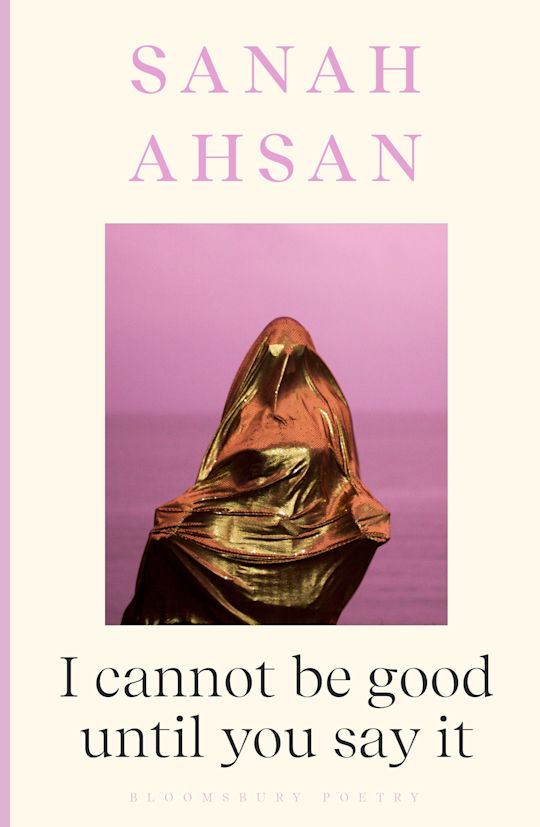I cannot be good until you say it (Shortlisted, Forward Prizes for Best First Collection)
Sanah Ahsan
(Bloomsbury Poetry, 2024); pbk, £9.99
Sanah Ahsan’s I cannot be good until you say it is a poetry collection of uncompromising vulnerability. Awarded the Out-Spoken Performance Poetry Prize and shortlisted for the Queen Mary Wasafiri New Writing Prize, the White Review Poet’s Prize and the Bridport Prize, Ahsan’s confrontational and questioning poetry is full of heart. It is fearless and focused and is one of the best poetry collections I have read in a long time.
The title of the collection itself plunges the reader into the text’s preoccupation with the psychological; the raw quest for an uncompromising self while being defined by others. Ahsan’s career as a clinical psychologist informs the subject matter, with ‘My Body an Ear’ being a powerful example of this. Lines collide and flurry, conveying the extent of the hurt and highlighting a political poetics:
growth is
exhausting the trees back home
according to Klein objects are not
good-enough mothers not good
enough systems build Jenga
towers in the waiting area topple
a false hierarchy this madness a
conversation with the state a
bullseye is disappearing in the
therapy room you ask for help
aiming an empty barrel with two
hurting hands i would like to kiss
better but better is a professional
liar i'll follow your directionless
shot from asafedistance
ancestral guts are giving
judicious pink look: experts of
suffering are everywhere like
your unflinching face mirrored in
the mess stay close even when it
reeks of familiarity[.]
Fearless and introspective, the speaker’s identity is often in constant conversation with their world. The fearlessness of that identity is portrayed through Ashan’s decision to intertwine the Arabic and English language artfully. Yet despite its courage, Ahsan provides a narrator that is also questioning and conflicted about their self-worth and their standing. It is a delicate line that Ahsan walks superbly.
Throughout the collection, Ahsan portrays the human as complex, messy and vulnerable. But with an equal intensity, Ahsan works to emphasise the divinity of the ordinary person. It is a persistent move of Ahsan’s, established by the collection’s dedication (‘for the Divine in you’) to situate the human being and human feelings as sacred. The collection’s dedication to the individual is often identified through their relationship to others, identifying the self within relationships to lovers, family, religion, and community. Yet its articulation is interlaced with thoughts of self-doubt and self-loathing. Ahsan pays close attention to the chronology of the poems, guiding the reader through in rich and provocative interrogations.
The collection is divided into four sections, each introduced by a quotation from authors, poets and activists. In their preface to the collections third section, Ahsan quotes Sara Ahmed:
the etymology of the word “queer”, comes from the Indo-European word “twist”. Queer
is [...] a spatial term, which then gets translated into a sexual term, a term for a twisted
sexuality that does not follow a “straight line”, a sexuality that is bent and cooked.
This quote and the others like it, frame the subject of the individual sections while also placing Ahsan’s work in dialogue with the contemporary world and a host of politically engaged writers.
Despite its deeply political intent, Ahsan’s collection is about as personal as a work of poetry can be; it is an embodiment of how the self is articulated and conceived in response and in reaction to the surrounding world. Ahsan’s use of multi-media, a Spotify playlist, confirms this. The playlist, created by Ahsan, is called ‘Listening Room’, a reference to Foluke Taylor’s Unruly Therapeutic: Black Feminist Writings and Practices in the Living Room. It is the soundtrack that Ahsan grew up with and works to strengthen not only the intertextuality of the collection but reflects the personality that brings this collection so much life.
Shannon O’Donnell


Leave a Reply